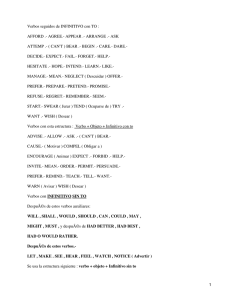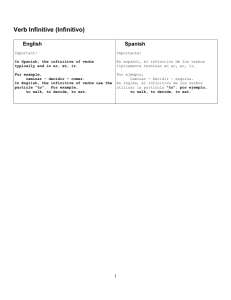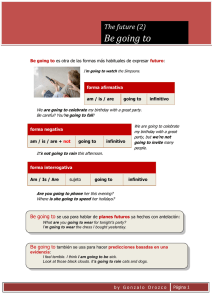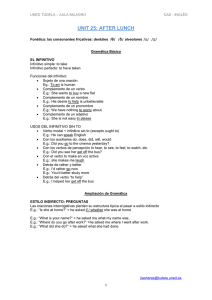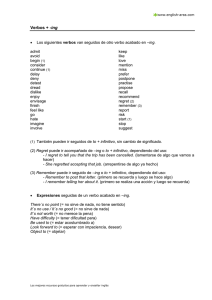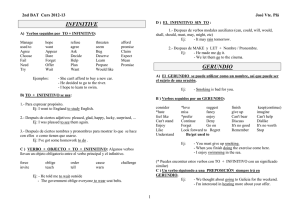GERUNDIO/INFINITIVO 1.- Van seguidos de GERUNDIO a) Los
Anuncio
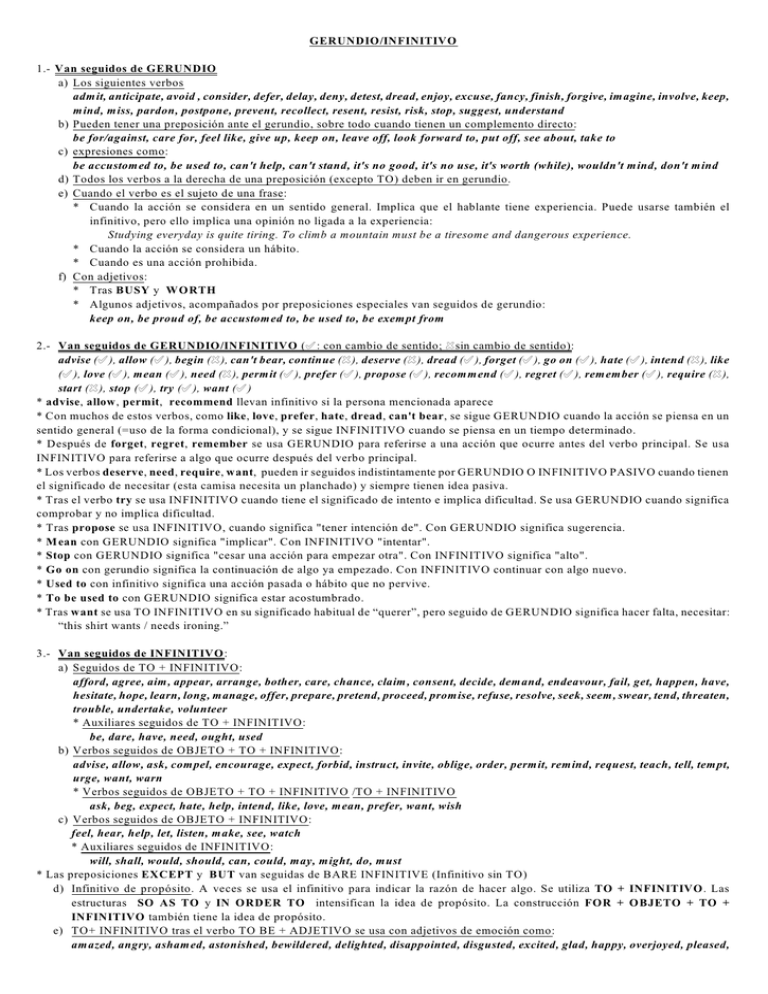
GERUNDIO/INFINITIVO 1.- Van seguidos de GERUNDIO a) Los siguientes verbos adm it, anticipate, avoid , consider, defer, delay, deny, detest, dread, enjoy, excuse, fancy, finish, forgive, im agine, involve, keep, m ind, m iss, pardon, postpone, prevent, recollect, resent, resist, risk, stop, suggest, understand b) Pueden tener una preposición ante el gerundio, sobre todo cuando tienen un complemento directo: be for/against, care for, feel like, give up, keep on, leave off, look forward to, put off, see about, take to c) expresiones como: be accustom ed to, be used to, can't help, can't stand, it's no good, it's no use, it's worth (while), wouldn't m ind, don't m ind d) Todos los verbos a la derecha de una preposición (excepto TO) deben ir en gerundio. e) Cuando el verbo es el sujeto de una frase: * Cuando la acción se considera en un sentido general. Implica que el hablante tiene experiencia. Puede usarse también el infinitivo, pero ello implica una opinión no ligada a la experiencia: Studying everyday is quite tiring. To climb a mountain must be a tiresome and dangerous experience. * Cuando la acción se considera un hábito. * Cuando es una acción prohibida. f) Con adjetivos: * Tras BUSY y W ORTH * Algunos adjetivos, acompañados por preposiciones especiales van seguidos de gerundio: keep on, be proud of, be accustom ed to, be used to, be exem pt from 2.- Van seguidos de GERUNDIO/INFINITIVO (°: con cambio de sentido; ¯sin cambio de sentido): advise (°), allow (°), begin (¯), can't bear, continue (¯), deserve (¯), dread (°), forget (°), go on (°), hate (°), intend (¯), like (°), love (°), mean (°), need (¯), perm it (°), prefer (°), propose (°), recom m end (°), regret (°), rem em ber (°), require (¯), start (¯), stop (°), try (°), want (°) * advise, allow, permit, recommend llevan infinitivo si la persona mencionada aparece * Con muchos de estos verbos, como like, love, prefer, hate, dread, can't bear, se sigue GERUNDIO cuando la acción se piensa en un sentido general (=uso de la forma condicional), y se sigue INFINITIVO cuando se piensa en un tiempo determinado. * Después de forget, regret, remember se usa GERUNDIO para referirse a una acción que ocurre antes del verbo principal. Se usa INFINITIVO para referirse a algo que ocurre después del verbo principal. * Los verbos deserve, need, require, want, pueden ir seguidos indistintamente por GERUNDIO O INFINITIVO PASIVO cuando tienen el significado de necesitar (esta camisa necesita un planchado) y siempre tienen idea pasiva. * Tras el verbo try se usa INFINITIVO cuando tiene el significado de intento e implica dificultad. Se usa GERUNDIO cuando significa comprobar y no implica dificultad. * Tras propose se usa INFINITIVO, cuando significa "tener intención de". Con GERUNDIO significa sugerencia. * M ean con GERUNDIO significa "implicar". Con INFINITIVO "intentar". * Stop con GERUNDIO significa "cesar una acción para empezar otra". Con INFINITIVO significa "alto". * Go on con gerundio significa la continuación de algo ya empezado. Con INFINITIVO continuar con algo nuevo. * Used to con infinitivo significa una acción pasada o hábito que no pervive. * To be used to con GERUNDIO significa estar acostumbrado. * Tras want se usa TO INFINITIVO en su significado habitual de “querer”, pero seguido de GERUNDIO significa hacer falta, necesitar: “this shirt wants / needs ironing.” 3.- Van seguidos de INFINITIVO: a) Seguidos de TO + INFINITIVO: afford, agree, aim , appear, arrange, bother, care, chance, claim , consent, decide, dem and, endeavour, fail, get, happen, have, hesitate, hope, learn, long, m anage, offer, prepare, pretend, proceed, prom ise, refuse, resolve, seek, seem , swear, tend, threaten, trouble, undertake, volunteer * Auxiliares seguidos de TO + INFINITIVO: be, dare, have, need, ought, used b) Verbos seguidos de OBJETO + TO + INFINITIVO: advise, allow, ask, com pel, encourage, expect, forbid, instruct, invite, oblige, order, perm it, rem ind, request, teach, tell, tempt, urge, want, warn * Verbos seguidos de OBJETO + TO + INFINITIVO /TO + INFINITIVO ask, beg, expect, hate, help, intend, like, love, m ean, prefer, want, wish c) Verbos seguidos de OBJETO + INFINITIVO: feel, hear, help, let, listen, m ake, see, watch * Auxiliares seguidos de INFINITIVO: will, shall, would, should, can, could, may, m ight, do, must * Las preposiciones EXCEPT y BUT van seguidas de BARE INFINITIVE (Infinitivo sin TO) d) Infinitivo de propósito. A veces se usa el infinitivo para indicar la razón de hacer algo. Se utiliza TO + INFINITIVO. Las estructuras SO AS TO y IN ORDER TO intensifican la idea de propósito. La construcción FOR + OBJETO + TO + INFINITIVO también tiene la idea de propósito. e) TO+ INFINITIVO tras el verbo TO BE + ADJETIVO se usa con adjetivos de emoción como: am azed, angry, asham ed, astonished, bewildered, delighted, disappointed, disgusted, excited, glad, happy, overjoyed, pleased, proud, sad, shocked, sorry, surprised, upset y con otros como awkward, difficult, easy, hard, possible. EJEM PLOS The Prime Minster admitted taking bribes. Get some instruction even though you don't anticipate using it. He turned his head trying to avoid breathing in the vapour. If you mean to do something do it deliberately. You might consider moving to a new house. The company deferred paying the employees. She delayed starting divorce proceedings for six months. They detest (the very thought of) living elsewhere. Everything you dread doing you must do straight away They dreaded him coming. I enjoy playing my guitar. I could never excuse him for being so rude I could never excuse his being so rude She asked to be excused from acting that evening. Excuse me butting in. I don't fancy going back to that dreary house alone. He finished the argument (by) walking out of the room. They finished up serving in a shop. The family could be forgiven for thinking we’re living in London. I can't imagine asking him for money. Try to imagine (you're) sitting in a cloud. Caring for a one-year-old involves changing nappies and making special meals. Keep going, don't stop. If you don't mind me/my saying so. I miss watching my favourite series, but it's not on any longer. Pardon me for interrupting/Pardon my interrupting. To delay something is to postpone it happening. You prevent someone from doing something. Are you instructed to prevent me entering? I recollect playing here when this was a playground. They resent being treated as common criminals. If you resist doing something you stop yourself from doing it. If you have an expensive rug don't risk washing it yourself. He suggested going to the cinema. I only understand killing in self-defence. I'm for/against going to that house again. I care for starving people. John gave up drinking five years ago. He kept on drinking till he died. I'm looking forward to seeing you again They kept putting off signing the paper. She went to the office to see about (getting) an increase. If you take to doing something, you begin to do it as a regular habit. He can't help being useless I can't help thinking it was a mistake to let him go. I can't stand listening to that noise all the time. It's no use begging him, he won't lend you any money. It's no good worrying any more tonight. It's worth paying a little attention. I don't mind staying a little longer. I wouldn't mind being paid a little more. I'm accustomed to getting up quite early. I'm used to getting up quite early. I'm busy talking on the phone. It's worth paying a little extra. However we complain they keep on throwing parties. I'm proud of being who I am. I am glad to see you There are many verbs that are not generally used in the progressive tenses and others that are not used in certain of their meanings. (In grammars, these verbs are often called “stative verbs”; verbs that can normally have progressive forms are called “dynamic verbs”.) The most important of these verbs are: 1. Dislike, hate, like, love, prefer, want, wish. 2. Astonish, impress, please, satisfy, surprise. 3. Believe, doubt, feel (have an opinion), guess, imagine, know, mean, realize, recognize, remember, suppose, think (have an opinion), understand. 4. Hear, see, measure (have length, etc), taste, (have a flavour), smell (give out smell), sound, weigh (have weight). 5. Belong to, concern, consist of, contain, depend on, deserve, fit, include, involve, lack, matter, need, owe, own, possess. 6. Appear, resemble, seem. Compare the progressive and non-progressive uses of certain verbs: W hat are you thinking about?. . . . . . . . . . . . . . . . . . . . . . . . . . . . . . . . I’m feeling fine. . . . . . . . . . . . . . . . . . . . . . . . . . . . . . . . . . . . . . . . . . . W hy are you sm elling the meat? Is it bad?. . . . . . . . . . . . . . . . . . . . . . I’m just tasting your whisky.. . . . . . . . . . . . . . . . . . . . . . . . . . . . . . . . . The scales broke when I was weighing myself. . . . . . . . . . . . . . . . . . . W hy’s that man m easuring the street?. . . . . . . . . . . . . . . . . . . . . . . . . . I’m seeing Philip tomorrow. . . . . . . . . . . . . . . . . . . . . . . . . . . . . . . . . . I think you’re right. I feel we shouldn’t do it. The meat sm ells bad. Your whisky tastes wonderful. I weigh 68 kilos. I m easure 75 cm around the waist. I see what you mean. Note the common use of can see and can hear instead of progressive tenses of see and hear: I can hear a funny noise I can see a woman doing the housework in the flat opposite. Note that verbs which are never used in progressive tenses (like know) have “-ing” forms which can be used as participles, objects of prepositions, etc. Knowing her tastes, I bought her a large box of chocolates. I don’t like to go to a foreign country without knowing a little of the language.
